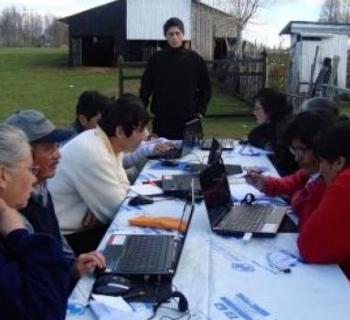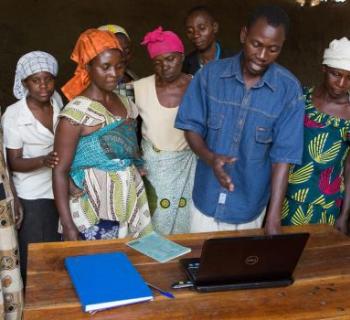


The work of the EIFL Public Library Innovation Programme demonstrates how, by using digital technology and with minimal additional funding, public libraries can be effective and sustainable rural development partners. They are helping to improve farmers’ lives and livelihoods by connecting them to information, providing free ICT access and training, and bridging the urban-rural divide, linking distant farming communities to vital sources of city-based information, expertise and support.
For example, in Chile, a public library agricultural information service is helping farmers in the Andes mountains keep up to date with advances in farming methods. In Uganda, a public library is helping farmers to combat plant pests and diseases by using mobile phones to connect them to city-based scientists. In central Serbia, a public library has helped revitalize a declining rural economy by teaching farmers ICT skills, demonstrating to farmers the value of online information and creating an online agricultural produce market. In Latvia, farmers now have access to regular webinars about government support and subsidies in their local libraries.

“The AgroLib-Ja team showed me how to make a profile on the AgroLib market, and I have now come across a lot of agricultural forums. I also found new customers. I think that the internet is a good way of associating farmers and a good way of exchanging experiences.” - Dejan Stanković, dairy farmer, Serbia, speaking about Jagodina Public Library’s AgroLib-Ja ICT training, agricultural information service, and online market for farmers.
“Through the internet, I discovered new nutritious plant species that I can plant alongside my bananas. Now I have started a nursery bed with 600 seedlings of Luceana, which I am selling to fellow farmers.” - John Baluku, farmer, speaking about Maendeleo Foundation/Uganda Community Libraries Association Connect Uganda project, which trains farmers to use ICT and translates information found online into local languages.
“We always had to ask someone to do a favour - to send an email or to look for information. Now we can do it on our own.” - Luz Estela Villa Martinez, farmer, who attended ICT classes at Public Library Laboratoria del Espiritu in Colombia.
“It is of vital importance that in each community there is a place where people gather, exchange information and learn. Such centres should be libraries.” - Bojana Dimitrijevic, a deputy of the Jagodina Town Assembly, Serbia, speaking about Jagodina Public Library’s AgroLib-Ja service for farmers.
“The library’s service responds to the main objective of the 2014-2020 Rural Development Regulation: to stimulate not only traditional farmers’ activities in livestock and crop production, but also in commerce. The library’s new internet site for farmers offers the possibility to advertise agricultural produce for free and will be very useful for small farmers who have to compete with bigger producers.” – Paulius Petkevicius, Pasvalys District Municipality Administration, Lithuania, speaking about Pasvalys ‘Marius Katiliskis’ Public Library’s mobile information and business support service for farmers.